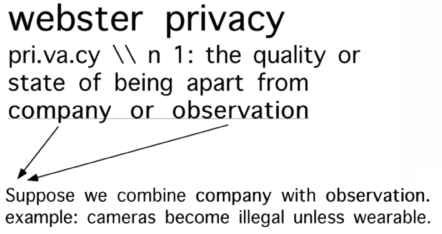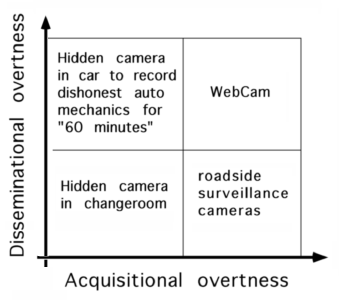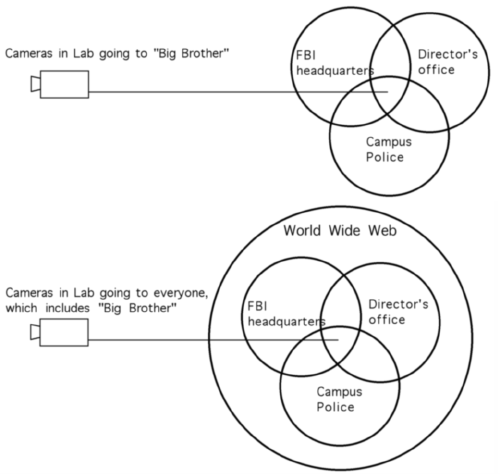
Overtness is a measure of how easy it is to see a camera or the signal from a camera, and recognize it as such. In other words, overtness is a measure of how easy it is to know when you (or others like you) are or have been on video.
One way to achieve overtness would be to require cameras to be attached to people:

Life becomes simpler then; you pick your nose when nobody is looking. Privacy is when you are alone. When you're with company, you're under observation.
Most people prefer to know when they are on camera (e.g. most people are disturbed more by the prospect of hidden cameras than by more overt cameras). However, particularly when the camera is hidden, the signal might not be.
Acquisitional overtness is a measure of how easy it is to spot the camera. Disemenational overtness is a measure of how easy it is to spot the signal. We can plot some cameras in the space of acquisitional overtness versus disseminational overtness:

A good example of an acquisitionally covert (hidden), yet disseminationally overt (broadcast) camera is one that is shrouded in secrecy beneath a ceiling dome of wine-dark opacity yet with the signal prominently displayed on a large TV screen hanging from the ceiling at the entrance to a department store.
Another famous example is the hidden camera in the womens' changeroom at Holy Cross hospital. The camera was discovered, not because someone spotted the camera itself, but because someone spotted the signal. The signal was being distributed within the building so that various people could view it, and it was harder to keep the camera secret as the distribution grew.
While, at first glance, people often express a concern about the dissemination of personal information, one could also argue that this very dissemination enhances privacy, because it brings the violations of privacy to light. Junk mail and annoying phone calls are a good thing because they continually remind us how much of our personal information is known by other entities.
Let me make an analogy to a natural gas leak. Natural gas is dangerous and has no smell of its own. It smells bad because the gas company has added bad smelling gasses to the mixture so that we will know when there is a natural gas leak. Now when we complain about the junk mail it is like complaining about the bad smell from our gas stove, rather than complaining about the fact that our stove is leaking. We don't like the bad smell, so we ask the gas company to improve the smell of their gas so that it will stop bothering us. Many of the traditional privacy advocates are doing what is equivalent to asking the government to pass laws to improve the smell of natural gas.
What we really should do is deal with the problem at the source.
Suppose, now that someone really famous (like Princess Di) goes into a department store fitting room where there are hidden cameras. Suppose that it becomes very tempting for the store manager, or some of his employees to distribute this video (e.g. to other employees, or to some of his friends in the police department, with a legitimate "law enforcement" justification). While this distribution is in some ways evil, it is the lesser of two evils. The acquisition is the greater of two evils. Thus the lesser of the two evils serves to possibly eliminate the greater of them.
When a picture of Princess Di trying on a bikini in a department store fitting room appears in a tabloid newspaper, someting would at last be done about these hidden cameras in department store fitting rooms. Either they would be made illegal (or if they were illegal in the state in question, there would be some kind of a "crackdown" on this illegal behaviour), or the bad publicity would cause people to stop shopping there, and the store would go out of business, also putting an end to the source of problem, not just the symptom.
People would strongly oppose a government-installed camera in their labs, yet often welcome a WebCam, such as the Rome Lab Web Cam, which allows anyone to look into one of the Rome Lab computer rooms at any time (take a look there right now if you want). It seems ironic, that anyone in the government, FBI, Campus Police, the director of the lab, etc, could look into the computer room, but for some reason, it is far more acceptable to make the video available to everyone in the whole Wide World, than it is to have a video line going only to some "Big Brother" entity:

Perhaps it is the fact that any evil that might come from the camera is apt to come right away, rather than years later. If something bad was to be done with the data, then surely it would happen soon, and there would be time to remove the camera before anything more happened.
I would assert that people who are being watched by a camera have a right to not only know that they are being watched, but to see how they look on the camera. They have a right to not only see the camera, but to see the signal that it produces. Surveillance cameras usually do not even allow us this right, but at least WebCams do, because they allow us to see ourselves on the World Wide Web, and to see exactly how we appear to others.
 .
.